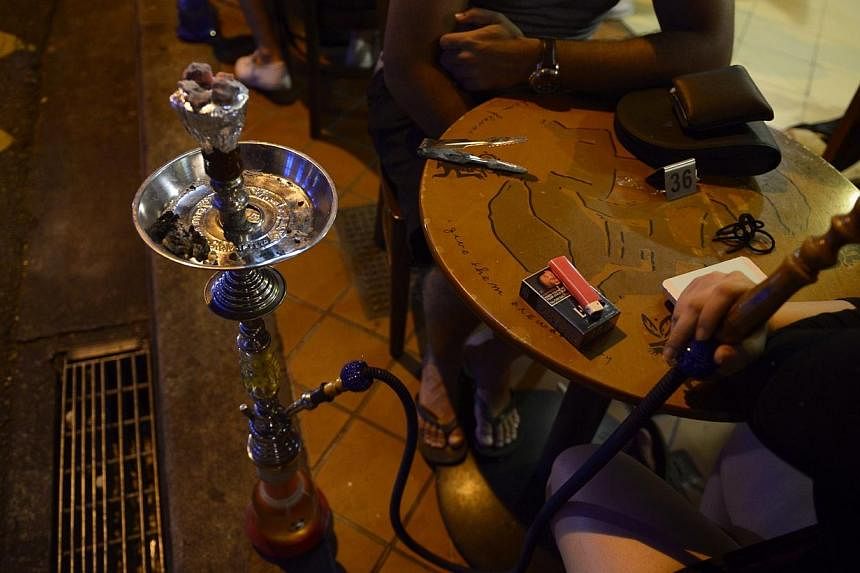Singapore is one of the few countries in the world to ban shisha, the sweet-smelling tobacco product that is smoked socially in several parts of the world.
But there is no saying what may be banned in a country.
Here are 10 other things and activities banned in other countries that may make you raise your eyebrows in surprise.
1. Kinder Surprise - United States

As a child, this may have been a more accessible form of a McDonald's Happy Meal.
While the rest of the world enjoys discovering the toy inside a Kinder Surprise, and then maybe eating the chocolate that comes along with it, the Food and Drug Administration (FDA) in the United States has banned the kids' favourite on the basis that the toys inside the eggs could be a choking hazard.
2. Valentine's Day - Saudi Arabia

Heart-shaped items like chocolates and any red item, even red flowers are banned in Saudi Arabia near Valentine's Day.
The prohibition of the celebration, named after a Christian saint said to have been martyred by the Romans in the 3rd Century, is in line with the country's strict Wahhabi school of Islam that that has been followed for more than a century.
The items are legal at other times of the year.
Anti-Valentine's Day patrols are conducted by the religious police as the day nears.
3. Sexy mannequins - Iran

Female mannequins in Iran have to be covered in the same way the women there must be.
They (the mannequins) must wear the headscarf, or hijab and cannot wear body-hugging clothes that expose their curves.
Iranian police stepped up a crackdown on women, men, boutiques and small companies which failed to enforce strict religious dress codes when former President Mahmoud Ahmadinejad took office in 2005.
4. Recorded music, opera, ballet - Turkmenistan

Former Turkmen President Saparmurat Niyazov banned the playing of recorded music at all public events, on television and at weddings.
In a decree, he said there was a need to protect Turkmen culture from "negative influences".
He also banned opera and ballet, describing them as "unnecessary".
It is believed the ban against these activities were to minimise foreign influence in the isolated former Soviet state.
5. Time travel movies - China

Chinese authorities thought that time travel resulted in frivolous depictions of "serious history" and therefore banned time travel movies.
The decision was made in 2011.
The country's State Administration for Radio, Film & Television said: "The producers and writers are treating the serious history in a frivolous way, which should by no means be encouraged anymore."
They added that the shows "casually make up myths, have monstrous and weird plots, use absurd tactics, and even promote feudalism, superstition, fatalism and reincarnation."
6. Grand Theft Auto (GTA) 5 - United Arab Emirates

The National Media Council in the country has banned the game for its explicit content that contains violence, sex and drug use.
The games can however be bought online.
7. McDonald's - Bolivia

It is not a law, but the country has very strict laws to protect its food sovereignty. Locals eat their own food in general.
In 2002 the global fast-food chain closed its last store.
The country's first indigenous president, Democratic-Socialist Evo Morales, who took office in 2006. slammed US fast-food chains, calling them a "great harm to humanity" and accusing them of trying to control food production globally.
8. Blue jeans - North Korea

Blue jeans come with an association to the US and are therefore banned.
Even a jeans line that North Korea had, in 2009, planned to export to a Swedish department store contained only black jeans.
The plan was aborted because the department store decided eventually that it did not want to get involved in a political issue.
The US and communist North Korea have over the past two decades been in a standoff over North Korea's nuclear programme.
Their relationship however goes back to 1945. The Korean peninsula was occupied in the South by the US and in the North by communist Soviet Union, now known as Russia. North and South Korea were established as two separate nations in 1948. Two years later, North Korean forces invaded South Korea.
Led by the US, a United Nations coalition of 16 countries undertook the defence of South Korea.
The two parts of Korea are still separated by a demilitarised zone.
9.Tomato ketchup in school cafeterias - France

In an effort to promote healthy eating and to protect traditional French cuisine, the French government banned school and college cafeterias nationwide from offering the American tomato-based condiment with any food except ironically, French fries.
Tomato ketchup cannot be used with food such as veal stew and boeuf bourguignon.
10. Second-hand clothes, including underwear - Ghana

Ghana Standards Board banned the sale of used underwear, pants and other second-hand goods like handkerchiefs and mattresses because they are considered unhygienic and could pose a health hazard.
The importation of these items was banned in 1994 but never implemented.
Sources: BBC News, Huffington Post, Buzzfeed Videos, The New York Times, The U.S Department of State website, The National

